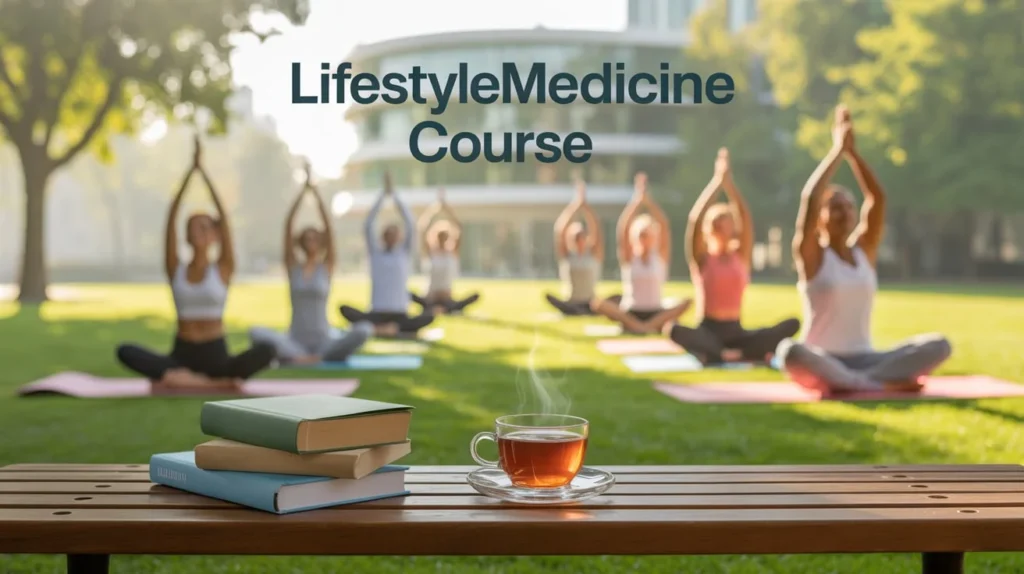Lifestyle Medicine Course – Health Through Evidence-Based Living
Health today is not just about treating illness; it’s about preventing it through smart, daily habits. That’s where a lifestyle medicine course steps in. It empowers both health professionals and individuals to address the root causes of chronic disease, not just the symptoms.
This course bridges the gap between modern medicine and healthy living. From stress management to plant-based nutrition, lifestyle medicine offers a science-backed approach to better health outcomes. Let’s explore why this course is becoming a must-have in the world of wellness and healthcare.
What Is a Lifestyle Medicine Course?
A lifestyle medicine course focuses on teaching how daily habits impact long-term health. It guides learners to prevent, manage, and even reverse chronic diseases by changing behaviours rather than relying solely on medication. Key topics include nutrition, physical activity, stress management, and sleep improvement.
This approach differs from traditional medicine in that it promotes long-term lifestyle changes rather than short-term fixes. The goal is to empower individuals and healthcare professionals to address the root causes of illness and build a healthier, more balanced life through evidence-based practices.
Key Benefits of Studying Lifestyle Medicine
Studying lifestyle medicine offers meaningful benefits for both personal well-being and professional growth. It equips learners with the tools to understand how behaviour shapes health and empowers them to promote lasting change. This knowledge not only enhances individual wellness but also supports more compassionate, effective care in clinical settings.
Key Benefits of a Lifestyle Medicine Course
- Helps healthcare professionals treat the cause, not just the condition
- Reduces dependency on medications through sustainable behaviour changes
- Opens doors to new career paths in preventive medicine and wellness
- Improves personal health and lifestyle for long-lasting change
- Enhances patient trust through holistic, empathetic care
Choosing the Right Lifestyle Medicine Course
Not all courses are created equal. It’s essential to choose one that aligns with your goals, background, and learning style. Look for programs that are evidence-based, accredited, and taught by qualified professionals.
Also, consider whether the course offers live sessions, practical assessments, or mentorship opportunities. These features can enrich your learning experience and support your application in real-world scenarios.
Who Should Take a Lifestyle Medicine Course?
This course is ideal for doctors, nurses, dietitians, health coaches, and even non-medical individuals passionate about wellness. It’s perfect for those who prioritise prevention over prescription and aim to lead or guide others toward healthier living.
Whether you’re seeking personal growth or professional expertise, lifestyle medicine education adds value to every stage of your health journey.
What Topics Are Covered in a Lifestyle Medicine Course?
These courses are structured around six key pillars of health. Each topic is based on evidence and medical research that supports long-term health improvement.
Main Topics
- Whole-food, plant-based nutrition
- Physical activity and movement
- Restorative sleep and circadian health
- Stress management and emotional resilience
- Avoidance of risky substances like tobacco and alcohol
- Building strong social relationships and community support
This comprehensive approach helps create healthier lifestyles at both personal and population levels.
How Long Is a Medicine Course?

Course length can vary depending on the provider and level of certification. Some programs are short-term (4–8 weeks), while others offer in-depth modules that stretch over several months. These courses are often flexible and available online, making them suitable for working professionals.
It’s common to find introductory courses as well as board certification paths, depending on your career goals and educational background.
Medicine Certification and Recognition
One significant advantage of completing a lifestyle medicine course is the global recognition it affords. Many courses are accredited and accepted by medical boards and health institutions. Certifications can boost your resume and expand your influence as a wellness advocate.
They also provide credibility in coaching, consulting, and integrative health roles, making you stand out in an evolving health landscape.
Practical Applications of a Lifestyle Medicine Course
Graduates of lifestyle medicine programs often use their skills in diverse settings. These include hospitals, private practices, corporate wellness programs, schools, and community organizations.
The approach is versatile and works well in conjunction with other fields, such as nutrition, psychology, public health, and even fitness coaching.
Key Feature
- Integrate it into general medical practice
- Launch a wellness clinic or consultancy
- Guide corporate health and employee wellness
- Educate communities on chronic disease prevention
- Support mental health programs through holistic methods
Is a Lifestyle Medicine Course Worth It?
Absolutely. Whether you’re seeking to enhance your well-being or advance your career in healthcare, this course offers a clear return on investment. The knowledge you gain doesn’t just impact you; it can transform lives around you.
The growing demand for preventive healthcare professionals ensures that your skills will remain relevant, meaningful, and impactful in the long term.
Final Thoughts on Enrolling in a Lifestyle Medicine Course
A lifestyle medicine course is more than an educational program; it’s a call to action for a healthier life. It empowers learners to make intentional choices that promote health from the inside out.
For professionals, it offers new tools to deliver patient care with empathy and a scientific basis. For individuals, it’s a journey toward a more balanced and fulfilling life.
This is a chance to make health simpler, more innovative, and more sustainable for everyone. With chronic disease rates rising, the timing for this shift in healthcare has never been better.
Frequently Asked Questions:
Is a lifestyle medicine course suitable for non-medical people?
Yes, many courses are designed for anyone passionate about health and well-being.
Can I take the course online?
Most programs are available online with flexible study options.
Do I need a background in medicine?
Not always. Some courses are open to the public, while others may require a healthcare background or experience.
.Will I get certified?
Yes, many providers offer certificates, and some are board-recognized.
How much time does it take to complete the task?
Courses can range from a few weeks to several months, depending on the level.


